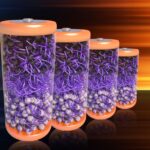 La Trobe University researchers have developed a transparent polymer derived from hyaluronic acid – a familiar ingredient in moisturisers – that might soon power your smart devices. By turning everyday skincare into a highly conductive, ultra-thin film, this material could enhance wearables, touchscreens, and biosensors with a blend of flexibility and clarity.
La Trobe University researchers have developed a transparent polymer derived from hyaluronic acid – a familiar ingredient in moisturisers – that might soon power your smart devices. By turning everyday skincare into a highly conductive, ultra-thin film, this material could enhance wearables, touchscreens, and biosensors with a blend of flexibility and clarity.
The team deposited the polymer onto a gold surface, creating a film called 2D PEDOT that combines near-invisible transparency with metal-like conductivity. As lead researcher Luiza Aguiar do Nascimento explained, the process not only forms dependable polymers when tethered directly to gold but also delivers films that are thinner and more conductive than what you typically see. This tethered dopant templating technique gives precise control over the polymer’s shape, transparency, and performance – a notable improvement over conventional conductive polymers that often struggle with consistency and flexibility.
Associate Professor Wren Greene and Dr Saimon Moraes Silva highlight that such advancements could significantly impact healthcare technology, from smoothing patient monitoring to refining drug delivery systems. Developed in collaboration with La Trobe’s Institute for Molecular Science, BEST Research Centre, and the School of Agriculture, Biomedicine and Environment, the findings have been published in ACS Applied Materials and Interfaces. In a world where devices continually shrink and performance demands grow, this skincare-inspired breakthrough offers a fresh and practical approach.








